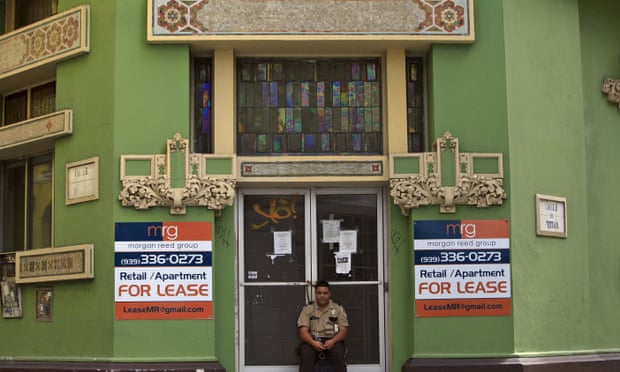As Puerto Rico grapples with crippling debt and double-digit unemployment, a far-fetched idea to tackle the US territory’s economic woes may be gaining modest traction – one that would see Puerto Rico break off from the United States to re-join Spain.
“By returning to Spain, we’ll have autonomy,” said José Nieves Seise, who in 2013 founded the group Reunification of Puerto Rico with Spain. “With autonomy Puerto Rico could have sufficient powers to boost the economy and attract foreign investment.”
On Sunday, as the commonwealth’s financial crisis continues to cast a shadow over its relationship with the US, some of the group’s more than 3,000 members will gather in Puerto Rico for their annual assembly to explore the idea of becoming the 18th autonomous region of Spain.
The movement is based on a mix of nostalgia and alternative history, with Nieves Seise pointing to what he calls a flawed depiction of Puerto Rico as a colony of Spain. “In reality it was an integral part of Spain. The US invaded us in 1898, and they separated us against our will.”
The split was superficial, he said, highlighting the similarities that endure between Spain and Puerto Rico to this day. “Puerto Ricans love the Spanish people; we’re Spanish. We want to return to the country to which we belong,” said the 43-year-old.
The idea is a long shot, as it relies on contesting the 1898 Treaty of Paris, which laid out the framework for the island to change from Spanish to American hands. Still, the group met with Spanish officials at the consulate in Puerto Rico last year. “Our goal was just to let them know that our movement exists and that it’s something serious.” This month Nieves Seise plans to send a letter to Spanish King Felipe VI, introducing the monarch to the movement.
Nieves Seise decided to launch the group out of frustration, after repeated calls to address Puerto Rico’s status were ignored by the US. A 2012 referendum found 54% of the island’s 3.5 million inhabitants favoured changing the island’s current territorial status. The financial crisis has also injected renewed vigour into the campaigns pushing for American statehood for Puerto Rico and those pushing for independence.
Nieves Seise rejected these rival campaigns, denying claims by critics who argue that Puerto Rico had fewer freedoms under Spanish rule. Instead he touted the economic advantages of joining Spain, arguing that benefits such as coming under the EU umbrella would allow Puerto Rico to move forward after nearly a decade of economic stagnation.
The island would also be afforded political rights currently denied to them by the US, he said. “Right now, we can’t vote for the president of the United States, we have limited representation.”
The group has already managed to secure the backing of some in Spain, with a handful of support groups cropping up in recent years in the cities of Málaga and Granada.
In January, about a dozen supporters in the province of Castellón formally launched a group, said Spaniard Cristofer Pons Rodríguez. “Personally, I was attracted to the idea of creating a community of citizens that share the Spanish culture,” said the 24-year-old, drawing parallels with the Commonwealth or Francophonie. “It would be about creating a Hispanic bloc as an alternative to the Anglo-Saxon world, to defend our interests.”
As Spain struggles to shake off the lingering effects of a double-dip recession, Pons Rodríguez dismissed concerns that taking in Puerto Rico and its $72bn worth of public debt could dampen Spain’s tepid economic recovery. “This shouldn’t be an impediment to working together,” he said. “The more united we are, the better chance we have of overcoming issues like debt.”
To date the movement has not received any kind of formal response from Spanish authorities. Recently Puerto Rican Iván Arrache called on Spain to take action. “Are they going to leave us to do all the work ourselves?,” he wrote in El Diario de La Marina. “It takes two to tango.”
Spain stands to benefit from taking Puerto Rico into its fold, he said. “Don’t they appreciate the impact this would have against Catalan separatism and how this would help foster the idea of a united Spain?”
After two years of nurturing the movement in Puerto Rico, he said, it was time to establish whether there is any official interest in the idea from Spain. “Spain needs to give us a token of good faith, even if it’s just symbolic,” he said. “Many of us here are ready to give our all. All we’re asking for is something from the other side.”
Ashifa Kassam in Madrid
The idea is a long shot but campaigners assert that the countries were closely integrated until the US separated them against their will
Puerto Rico movement pitches solution to economic woes: rejoin Spain
No comments:
Post a Comment